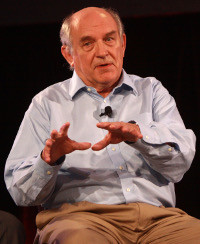Biographical and bibliographical essay

Charles Alan Murray (born 8 January 1943) is an American political scientist, author and columnist. His book Losing Ground: American Social Policy 1950–1980 (1984), which discussed the American welfare system, was widely read and discussed, and influenced subsequent government policy. He became well-known for his controversial book The Bell Curve (1994), written with Richard Herrnstein, in which he argues that intelligence is a better predictor than parental socio-economic status or education level of many individual outcomes including income, job performance, pregnancy out of wedlock and crime, and that social welfare programs and education efforts to improve social outcomes for the disadvantaged are largely wasted.
Reference
Biographical and bibliographical essay
Images
200x213 GIF, grayscale
Biography
Associations
Web Pages
Includes photograph, bibliographical summary and quotes
Includes photograph, policy areas covered, biographical/bibliographical summary, experience and education
Articles
Biographical and memorial essay covering Joan Kennedy Taylor's varied career
Discusses events at various universities where protesters, equating mere speech with (physical) violence, responded violently to speakers or their sponsors, prevented the talks from being made or otherwise disrupted them
Reviews
Critical review of Charles Murray's In Our Hands: A Plan to Replace the Welfare State (2006)
Review of Charles Murray's book What It Means to Be a Libertarian (1997), contrasting it with Tocqueville's writings in Democracy in America (1835-1840)
Books Authored
by Richard Herrnstein, Charles Murray, 1994
Partial contents: I: The Emergence of a Cognitive Elite - Steeper Ladders, Narrower Gates - II: Cognitive Classes and Cognitive Behavior - Unemployment, Iddleness and Injury - III: The National Context - IV: Living Together - Raising Cognitive Ability
- ISBN 0029146739: Hardcover, Free Press, 1994
- ISBN 0684824299: Paperback, Free Press, 1996
Contents: Introduction - One: A Sense of Accomplishment - Two: Identifying the People and Events That Matter - Three: Patterns and Trajectories - Four: On the Origins and Decline of Accomplishment - Appendices
- ISBN 006019247X: Hardcover, HarperCollins, 2003
- ISBN 0060929642: Paperback, Harper Perennial, Reprint edition, 2004
Partial contents: One: "The Happiness of the People" - Measuring Success in Social Policy - Two: When There is Bread - Enabling Conditions and Thresholds - Three: Toward the Best of All Possible Worlds - Policy and the Idea of Man
- ISBN 0671611003: Hardcover, Simon & Schuster, 1988
- ISBN 1558152970: Paperback, ICS Press, 1994
Partial contents: I: A Generous Revolution - The Kennedy Transition - II: Being Poor, Being Black: 1950-1980 - Poverty - Employment - Education - Crime - The Family - III: Interpreting the Data - Incentives to Fail - IV: Rethinking Social Policy
- ISBN 0465042317: Hardcover, Basic Books, 1984
- ISBN 0465042325: Paperback, Basic Books, 1986
- ISBN 0465042333: Paperback, Basic Books, 10th Anniv edition, 1994
Partial contents: I: The Framework - An Image of Limited Government - II: How Would It Work? - Removing Government from Economic Life - Removing Government from Civil Life - III: Is It Possible? - Government as "Them" - The Demand to Be Left Alone
- ISBN 0553069284: Hardcover, Broadway Books, 1997
- ISBN 0767900391: Paperback, Broadway Books, Reprint edition, 1997
The introductory paragraph uses material from the Wikipedia article "Charles Murray (political scientist)" as of 7 Aug 2018, which is released under the Creative Commons Attribution-Share-Alike License 3.0.
